From your vit A, B and C to your folic acid, selenium, zinc and chromium, the world of supplements is a minefield. You add a whole host of different ways to take them like capsules, pills, gummies, drinks and the whole conversation becomes a hell of a lot more confusing.
But don’t fret, we got you.
Us women are constantly bombarded with advice on what to take, at what age, to combat different concerns and lifestyles. You add in trying for a baby, carrying a baby, periods, contraception and hormone changes into the mix, and it can be pretty easy to become overwhelmed by what your body actually needs at what point.
We caught up with dietician and nutritionist, Hannah Pheasant Oldfield, from Dishy Dietetics, to talk about the best vitamins for women to take on a daily basis (for those who really don’t know where to start).
If you’re a woman looking to up your vitamin game and you’re overwhelmed by what’s available, where’s the best place to start?
“Everyone is individual so it’s helpful to understand what supplements you need before you go out and purchase them.
Before taking individual supplements, you should consider what life stage you’re at and what specific benefits you’re looking to get from your supplementation.
Maybe you’re trying to conceive? Or perhaps you’ve just had a baby and you’re currently breastfeeding, all of these things will massively impact the types of vitamins your body needs, as well as dictating what you can’t take.
Another thing to consider is your current health status. Ask yourself why you need to take a supplement? Perhaps you’re more bloated after eating a meal? Or maybe you’re feeling extra stressed and need to look at making changes to your lifestyle, diet and supplementation - not just one of them.”
If you had to choose one vitamin for women to add into their diet on a daily basis, what would it be?
“If you’re going to add one, the Vitamin D is the one that I always recommend my clients. Even if you have a healthy, balanced diet, one of the dietary requirements we are often unable to get enough of is sunshine, and this is where most of your vitamin D comes from.
It’s known as the sunshine vitamin as we make it under our skin when we are outside in daylight.
All women should consider taking a daily vitamin D supplement especially during the autumn and winter. There are some high-risk groups who should consider taking a supplement all year round. For example, if you spend very little time outside during the summer (April to September) which lots of us who work in offices do, or people who have darker skin tones as the pigment in dark skin doesn’t allow the skin to absorb as much UV radiation.”
If you're looking to up your intake of certain vitamins, would you advise to do this through diet or supplementation?
“I would always advise an individual to try and aim for a balanced, varied and healthy diet that is rich in nutrient-dense foods, combined with a safe level of sun exposure. Although, there are times, particularly in the UK where sunlight is often lacking or we’ve been burning the candle at both ends that an individual needs a supplement to help them meet their body’s requirements.”
Should you adapt your vitamin intake depending on your age? If so, how?
“Nutritional requirements vary across a woman’s stage of life, this is particularly important before and during pregnancy. For example, women who are trying to conceive and women who are in the first 12 weeks of pregnancy should take 400 micrograms of folic acid daily to reduce the risk of neural tube defects in the unborn baby. All pregnant women should also take a 10 microgram (or 400 IU) supplement of vitamin D each day. Some pregnant women may also need an iron supplement if blood tests show they are anaemic.
People who have been diagnosed with specific conditions have an increased risk of nutritional deficiencies and may require supplementation. Restrictive diets can also make it harder to meet all your nutritional requirements.
Plant-based diets are also increasing in popularity, especially with women, due to their health and environmental benefits. A varied and well-balanced plant-based diet can provide all the key nutrients needed to keep you healthy across all life-stages. There are, however, a number of essential nutrients that are important to think about, especially if you choose to be vegan, such as iodine and vitamin B12."
